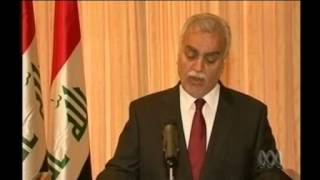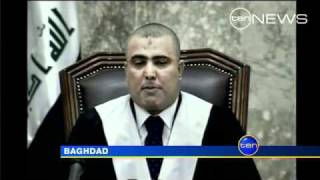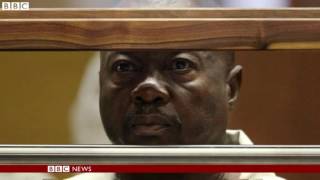Wednesday, 14 January, 2026г.
















Где искать: по сайтам Запорожской области, статьи, видео ролики
пример: покупка автомобиля в Запорожье
Iraq's vice-president Tareq al-Hashemi sentenced to death
http://timesofearth.com/Middle-East/?NT=&nid=58648 BAGHDAD - Iraq's fugitive Sunni vice-president was sentenced to death Sunday after a Baghdad court found him guilty of masterminding the killings of a lawyer and a government security official.
Hashimi was sentenced to hang in absentia "because he was involved directly in killing a female lawyer and a general with the Iraqi army," said Abdul Sattar al-Berqdar, a spokesman for Iraq's Supreme Judicial Council.
"There are many other charges against al-Hashimi, but this is one of the charges he was convicted of," al-Berqdar said
Hashemi was the most senior Sunni Muslim in the predominantly Shia Iraqi government until he was charged last December and went on the run.
The charges against him sparked a political crisis in Iraq.
Other Sunni politicians denounced Shia Prime Minister Nouri al-Maliki - who issued the warrant for Hashemi - as a dictator, accusing him of deliberate provocation that risked plunging the country back into sectarian conflict.
Iraq's Central Criminal Court issued the same sentence for al-Hashimi's son-in-law, Ahmed Qahtan, who also was at-large.
Sunni insurgents linked to al-Qaeda have been blamed for much of the recent violence in Iraq.
An arrest warrant was issued against al-Hashimi in December on charges of running death squads.
Interpol has issued a Red Notice against him for alleged terrorist acts. The Red Notice is an international alert to Interpol member states for help locating and arresting the vice president on terrorism charges brought by Iraqi Prime Minister Nouri al-Maliki.
Al-Hashimi has denied the charges against him and said they are politically motivated.
The Iraqi government issued the warrant for Hashemi's arrest on 19 December 2011, the day after the last US troops left the country.
He fled first to the largely autonomous Kurdish north of the country, and from there to Qatar and on to Turkey.
Prosecutors said Hashemi was involved in 150 killings. During his trial in absentia in Baghdad, some of his former bodyguards said Mr Hashemi had ordered murders.
He says the charges against him are politically motivated and has accused PM Maliki of fuelling sectarianism.
On Sunday, an Iraqi court found Hashemi and his son-in-law guilty of two murders and sentenced him to death by hanging. The judge dismissed a third charge for lack of evidence.
Although violence has decreased since its peak in 2006 and 2007, attacks have escalated again after the withdrawal of US troops from Iraq at the end of last year, amid increasing political and sectarian tensions.
The Iraqi government has been hampered by divisions between Sunni, Shia and Kurdish political groups.
The Iraqi government said July 2012 was the deadliest month in nearly two years, with 325 people killed.
Former Iraqi leader Saddam Hussein was a Sunni, and many Sunnis believe they are being penalised by Shias, who have grown in influence since the US invasion.
Sunnis have accused Maliki of taking an authoritarian approach to government.
The court ruling came as at least 64 people were killed in a wave of about 27 attacks across Iraq.
Sunday's violence, which struck at least 11 cities and also wounded nearly 100 people, highlighted armed groups' attempts to sow havoc in the country and undermine the government.
There was no immediate claim of responsibility for the attacks but security forces are a frequent target of al-Qaeda's Iraq branch, which has vowed to reassert itself and take back areas it was forced from before US troops withdrew from the country last year.
In the deadliest attack, gunmen stormed a small Iraqi Army outpost in the town of Dujail before dawn, killing at least 10 soldiers and wounding eight more, according to police and hospital officials in the nearby city of Balad, about 80km north of Baghdad.
The officials spoke on condition of anonymity as they were not authorised to release the information.
Похожие видео
Мой аккаунт


 У вашего броузера проблема в совместимости с HTML5
У вашего броузера проблема в совместимости с HTML5


